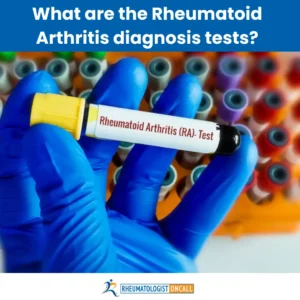SHARE
Many patients enduring pain, swelling, and stiffness may be on a prolonged journey before being diagnosed with Rheumatoid Arthritis (RA). It is crucial to understand how rheumatoid arthritis is diagnosed, as that will save you from additional suffering for months or even years before consulting a specialist.
Many of the steps that you need to take to be diagnosed with Rheumatoid Arthritis (RA), like ordering laboratory and imaging tests, can be done with your Primary Care Physician’s help.
What are the Rheumatoid Arthritis diagnosis tests?

Laboratory and imaging tests have limitations, but they help along with clinical signs and symptoms in establishing a definitive Rheumatoid Arthritis diagnosis.
Markers of inflammations (ESR, CRP)
- They are elevated in patients with active Rheumatoid Arthritis but can also be normal in certain situations.
Rheumatoid Factor
- This test is positive in about 60-70% of patients with Rheumatoid Arthritis; it can also be NEGATIVE in some patients
Anti-CCP antibodies
- This test is often ordered along with the Rheumatoid Factor, it is positive in 65% of patients with Rheumatoid Arthritis;
- The specificity of the anti-CCP antibodies test is over 90%.
Other tests
- To rule out diseases that can mimic Rheumatoid Arthritis symptoms (infections such as parvovirus, hepatitis B, C, TB, Lyme, and HIV)
ANA (antinuclear antibody) test
- To rule out other autoimmune diseases (e.g., lupus or Sjogren’s; both can be associated with Rheumatoid Arthritis)
What are the imaging tests for Rheumatoid Arthritis diagnosis?
Imaging tests like X-rays, MRI, and Ultrasound can be used further to help with the Rheumatoid Arthritis diagnosis.
1. X-rays of the hands, feet, knees
- Rheumatoid arthritis X-rays of hands and feet are very commonly obtained as an initial evaluation of the Rheumatoid Arthritis diagnosis.
- X-rays can evaluate the damage and progression of the disease.
2. Ultrasound
- This is a real-time imaging tool, radiation-free, used more in Europe.
- Detects active inflammation and joint damage
3. MRIs (Magnetic Resonance Imaging)
- Reserved for complicated Rheumatoid Arthritis cases, where the clinical story and the laboratory tests are not conclusive
- Detects active inflammation and joint damage
What are Rheumatoid Arthritis diagnosis criteria?
As rheumatologists, we often use the 2010 guidelines criteria to make the Rheumatoid Arthritis diagnosis:
- We count the number of small or large joints where we see signs of inflammation
- We look for elevated markers of inflammation, positive Rheumatoid factor, or anti-CCP antibodies
- We consider the duration of the symptoms (> or < than six weeks)
For each of these diagnosis criteria, we assign points. If we get a total score of 6 out of a total of 10 points, then we make a definitive diagnosis of Rheumatoid Arthritis (RA).
Introducing Rheumatologist OnCall’s Integrative Approach
At Rheumatologist OnCall, we emphasize a specialized and integrative approach specifically designed for Rheumatoid Arthritis patients. We offer to our patients not only treatment, but we strive to offer them education about nutrition through online courses, online physical therapy sessions, and mindfulness practices through a personalized approach to each patient’s needs.
We understand the importance of comprehensive care. Our goal is not only to diagnose and treat but to empower our patients with knowledge and tools to manage Rheumatoid Arthritis to the next level, achieve the best outcome, and live a full life.














